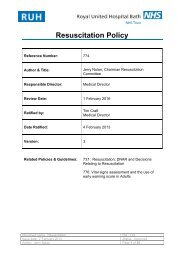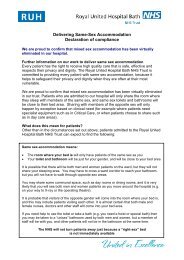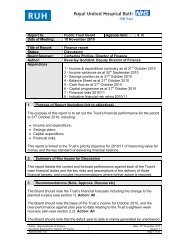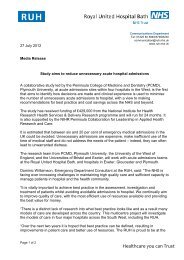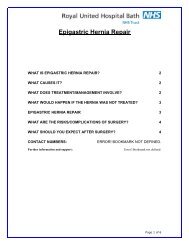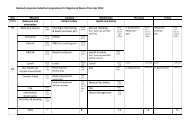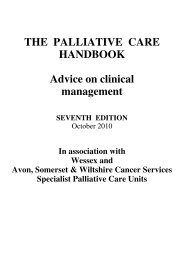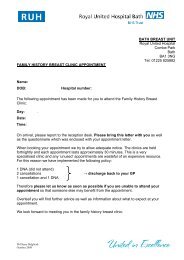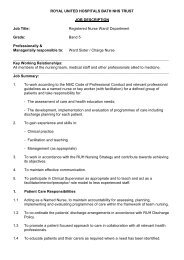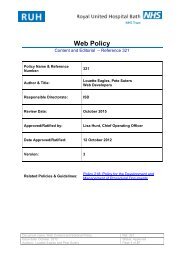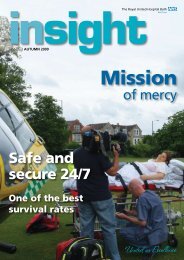Work Life Balance Policy
Work Life Balance Policy
Work Life Balance Policy
You also want an ePaper? Increase the reach of your titles
YUMPU automatically turns print PDFs into web optimized ePapers that Google loves.
<strong>Work</strong> <strong>Life</strong> <strong>Balance</strong> <strong>Policy</strong>Flexible <strong>Work</strong>ing | Special Leave | <strong>Work</strong>ing TimeReference Number: 170Author & Title:Alexandra Cudmore, Head of HRAnne Dye, Vice Chair of Staff SideResponsible Director:Director Human ResourcesReview Date: 2016Ratified by:Sue SmithDeputy Director of Human ResourcesDate Ratified: 06 September 2013Version: 1Related Policies & Guidelines:Appeal <strong>Policy</strong>Grievance <strong>Policy</strong>Managing Health & SicknessManaging Organisational ChangeMaternity, Paternity & Adoption Leave <strong>Policy</strong>Raising Concerns & StandardsRostering <strong>Policy</strong>Secondary Employment <strong>Policy</strong>Document name: <strong>Work</strong> <strong>Life</strong> <strong>Balance</strong> <strong>Policy</strong> Ref.: 170Issue date: 26 September 2013Status: ApprovedAuthors: Alexandra Cudmore & Anne Dye Page 1 of 20
Index:1. <strong>Policy</strong> Summary _______________________________________________ 42. <strong>Policy</strong> Statements _____________________________________________ 43. Definition of Terms Used _______________________________________ 53.1. Annualised Hours _________________________________________________ 53.2. Bereavement / Compassionate Leave ________________________________ 53.3. Career Break _____________________________________________________ 53.4. Close Relative ____________________________________________________ 53.5. Compensatory Rest _______________________________________________ 53.6. Compressed Hours _______________________________________________ 63.7. Daily Rest _______________________________________________________ 63.8. Flexible Retirement _______________________________________________ 63.9. Flexible <strong>Work</strong>ing __________________________________________________ 63.10. Home <strong>Work</strong>ing _______________________________________________ 73.11. Job Share ___________________________________________________ 73.12. Minimum Rest ________________________________________________ 73.13. Opt Out _____________________________________________________ 83.14. Public Duties _________________________________________________ 83.15. Special Leave ________________________________________________ 83.16. Team Based Rostering_________________________________________ 83.17. Term Time Only ______________________________________________ 83.18. Time Off In Lieu (TOIL)_________________________________________ 93.19. Weekly Rest _________________________________________________ 93.20. <strong>Work</strong>ing Time ________________________________________________ 94. Duties and Responsibilities _____________________________________ 94.1. Employee _______________________________________________________ 94.2. Manager________________________________________________________ 104.3. Human Resources Directorate _____________________________________ 104.4. Staff Side _______________________________________________________ 105. Procedure ___________________________________________________ 115.1. Flexible <strong>Work</strong>ing _________________________________________________ 115.2. Special Leave ___________________________________________________ 125.3. <strong>Work</strong>ing Time – <strong>Work</strong>ing Over 48 hours _____________________________ 126. Monitoring Compliance ________________________________________ 13Document name: <strong>Work</strong> <strong>Life</strong> <strong>Balance</strong> <strong>Policy</strong> Ref.: 170Issue date: 26 September 2013Status: ApprovedAuthors: Alexandra Cudmore & Anne Dye Page 2 of 20
6.1. Flexible <strong>Work</strong>ing _________________________________________________ 136.2. Special Leave ___________________________________________________ 136.3. <strong>Work</strong>ing Time – <strong>Work</strong>ing Over 48 Hours _____________________________ 137. Review _____________________________________________________ 138. References __________________________________________________ 14Appendix 1: Procedure for Flexible <strong>Work</strong>ing Applications ______________ 15Appendix 2: Application for Flexible <strong>Work</strong>ing ________________________ 16Appendix 3: <strong>Work</strong>ing Time Regulations Opt Out Form _________________ 17Document Control Information ______________________________________ 18Ratification Assurance Statement _____________________________________ 18Consultation Schedule _______________________________________________ 19Equality Impact: (A) Assessment Screening ____________________________ 20Amendment HistoryIssue Status Date Reason for Change Authorised1 Approved 06September2013New <strong>Policy</strong>, replacing SpecialLeave (160) and Flexible<strong>Work</strong>ing & <strong>Work</strong>ing Time(120).Sue SmithDeputy Directorof HumanResourcesDocument name: <strong>Work</strong> <strong>Life</strong> <strong>Balance</strong> <strong>Policy</strong> Ref.: 170Issue date: 26 September 2013Status: ApprovedAuthors: Alexandra Cudmore & Anne Dye Page 3 of 20
1. <strong>Policy</strong> SummaryThe purpose of this policy is to provide a framework for managers to supportemployees to be both in work and as productive as possible for the organisationduring work time by establishing both a means of agreeing flexible working patternson both a short and long term basis.The Trust recognises that employees will have personal circumstances on both andad hoc and longer term basis which may affect their work life balance and iscommitted to supporting employees to both obtain & continue their employment withthe Trust when personal circumstances change or issues arise, provided theflexibility or alterations requested are not to the detriment of the Trust or to patientcare.The Trust is funded by Public money which means that the Trust has a responsibilityto use these monies as efficiently as possible. The Trust recognises that the benefitsof increased flexibility in terms of Employee Engagement & Productivity are in theTrust’s interest and in the interest of its patients.2. <strong>Policy</strong> StatementsThis <strong>Policy</strong> recognises the Trust’s legal duty to request access to flexible working toall employees.The Trust recognises that consideration of an employee’s request should not beaffected by any of the nine protected characteristics outlined within the Equality Act(2010), nor should it be affected by their current status with regards to hours orcontract of employment, as per the Part-time <strong>Work</strong>ers (Prevention of LessFavourable Treatment) Regulations (2000) and the Fixed Term Employees(Prevention of Less Favourable treatment) regulations (2002).In addition, this <strong>Policy</strong> also recognises the Trust’s requirement, in line theEmployment Rights Act (2002), and Agenda for Change, to offer employees’reasonable time away from work in exceptional circumstances.This <strong>Policy</strong> also recognises the Trust’s responsibility, in line with the <strong>Work</strong>ing TimeRegulations (1998), to ensure that staff are not working excessive hours, as well asto protect the health and wellbeing of staff who are working particular patterns whichmay require pre-determined rest breaks to be honoured.Document name: <strong>Work</strong> <strong>Life</strong> <strong>Balance</strong> <strong>Policy</strong> Ref.: 170Issue date: 26 September 2013Status: ApprovedAuthors: Alexandra Cudmore & Anne Dye Page 4 of 20
3. Definition of Terms Used3.1. Annualised HoursAn Employee works a set number of hours over the course of afinancial year (01 st April to 31 st March) without working a consistentpattern per week or per month. For payroll purposes employeesworking on annualised hours will be paid in 12 equal monthlypayments, based on the average hours worked per week should thetotal number of hours to be worked over the year be divided equallyacross the 52.143 weeks of the year. Where sickness occurs, sick paywill be calculated based on the average weekly hours & salary used forpayroll purposes, outlined above.3.2. Bereavement / Compassionate LeaveProvision for one day’s paid Special Leave to attend the funeral of aclose relative or provision for up to one working week’s paid leave forthe death of an immediate relative or dependent.3.3. Career BreakA significant period or unpaid leave, usually 12 months or more, duringwhich time the employee will not be expected to take up other paidemployment, and following which there is no guarantee of a return to arole within the organisation. Where the Trust has no suitable postsavailable in the 12 weeks prior to an employee’s return date the Trustwill have no obligation to provide a post and the employee’s contract ofemployment will be terminated. Employees on Career Break from theTrust will be contacted as necessary by their manager to requestclarity with regards to the employee’s intention to return.Career breaks are not considered as a Break in NHS Service but theperiod of absence cannot be considered as reckonable service.3.4. Close RelativeFor the purposes of Special Leave, a relative will be considered as anemployee’s child, partner, grandparent, parent, or sibling of parent, orsibling. This applies to adoptive, step-relatives or relations bymarriage.3.5. Compensatory RestWhere an employee’s rest period is interrupted or deferred becausethey are required to work, they should be compensated to the samedegree for the time lost. This should be following the working period orthe following day, although this can be varied by mutual consent.There is no requirement for the Trust to compensate financially forcompensatory rest, i.e. where rest falls outside the employee’s shiftDocument name: <strong>Work</strong> <strong>Life</strong> <strong>Balance</strong> <strong>Policy</strong> Ref.: 170Issue date: 26 September 2013Status: ApprovedAuthors: Alexandra Cudmore & Anne Dye Page 5 of 20
pattern in a scheduled period of unpaid rest, the compensatory rest willbe deemed to have been given.Where compensatory rest needs to be provided as a consequence ofan employee being on call and being called into work, the manager isresponsible for ensuring that, where the workload at night is likely to behigh, it should be the norm that daytime commitments the following dayare arranged in such a way that compensatory rest can be given, ie:not rostered at all the following day, or to start later or finish earlier toensure that sufficient rest is provided and the employee’s health andwellbeing is not adversely affected.3.6. Compressed HoursA working pattern which allows the employee to complete their weeklyhours in a reduced number of days, for example, by starting early andfinishing late.3.7. Daily RestA period of uninterrupted rest of 11 hours’ or more each day. There isno requirement for this rest to be paid & most employees will receivethis as part of their normal shift or working pattern.3.8. Flexible RetirementFollowing the abolition of the Statutory Retirement Age, an employeewishing to retire from the Trust should do so by resigning from theirpost with the appropriate notice period. However, an employeewishing to continue in employment but to claim their pension may do sobut will not have an automatic entitlement to return to their previouspost and will be subject to a selection process which may includeexternal competitors. Should an employee be successful in theirapplication for their previous post their working time will be restricted tono more than 16 hours per week for the 4 weeks following their reappointmentto the Trust, which must be at least 24 hours following thetermination date of their previous contract of employment.3.9. Flexible <strong>Work</strong>ingFlexible <strong>Work</strong>ing refers to any request to vary the contracted pattern ofwork. Where an employee works a flexible working pattern, theirannual leave & bank holiday entitlement must be calculated in hoursand will be pro rata.All requests for flexible working must be considered in line with thispolicy and procedure and must be reviewed annually as part of anemployee’s appraisal.No Flexible <strong>Work</strong>ing pattern is agreed for a period of longer than 12months to ensure that it continues to be in line with the needs of theservice.Document name: <strong>Work</strong> <strong>Life</strong> <strong>Balance</strong> <strong>Policy</strong> Ref.: 170Issue date: 26 September 2013Status: ApprovedAuthors: Alexandra Cudmore & Anne Dye Page 6 of 20
Employees working less than full time (37.5 hours per week for Agendafor Change staff) will only be eligible for overtime payments once theyhave achieved 37.5 hours per week; payments for unsocial hours, andother enhancements on payments are not affected.3.10. Home <strong>Work</strong>ingWhere an employee works from home for a predetermined period tocomplete an agreed piece of work which is to the benefit of the Trust inits aim of providing care to patients. Employees have a responsibilityto ensure that they are appropriately contactable when working fromhome and that they provide regular updates regarding their progress toensure that productivity is not being adversely affected.3.11. Job ShareWhere two or more employees are contracted separately to complete awhole time equivalent post, this may require a slightly higher level ofwhole time equivalents to ensure that there is opportunity for handover.<strong>Work</strong>ing patterns must be complimentary and in the interests of theservice.There is no requirement that one job sharer provide cover for anotherwhere there is annual leave or absence of another nature, although thiscan be agreed locally by mutual consent.Where only one job share partner remains, the additional hours shouldbe offered to that individual(s) and advertised should they not be ofinterest to the remaining party / parties. Existing Job sharer(s) shouldbe fully engaged in the selection process to ensure team fit. Where nosuccessful applicants can be appointed following two rounds ofexternal advertisement the remaining job sharer(s) will be consideredfor redeployment in line with the Trust’s Managing OrganisationalChange <strong>Policy</strong>.3.12. Minimum RestThe <strong>Work</strong>ing Time Regulations 1998 make provision for minimum restin the working day and working week. There is no requirement forthese periods of rest to be paid, and they will usually be providednaturally though a break in the working pattern.Under section 22 of the Regulations, the requirements with regards tominimum daily & weekly rest do not apply to shift workers. However,wherever possible these minimum rest periods should be honoured &provision made to support the employee to take the minimum break.Where this is not possible, reasonable steps should be taken tosupport the employee to ensure that they remain able to undertaketheir work safely.Document name: <strong>Work</strong> <strong>Life</strong> <strong>Balance</strong> <strong>Policy</strong> Ref.: 170Issue date: 26 September 2013Status: ApprovedAuthors: Alexandra Cudmore & Anne Dye Page 7 of 20
3.13. Opt OutThe process by which an employee indicates that they wish to workover the 48 hours per week limit out lined in the <strong>Work</strong>ing TimeRegulations 1998. Employees wishing to work over this limit may onlydo so with the agreement of their manager and by completing an ‘OptOut’ form (Appendix 3). This form should then be returned to HumanResources.3.14. Public DutiesUp to two weeks paid Special Leave is available for those required toundertake Jury Service or training exercises as Reservists where thisinterest was declared to the Trust at the time of appointment andwhere employees do not also claim monies from either the Courts orthe Ministry of Defence.Where an employee holds a Public Duty, they will be entitled to up to2.5 days unpaid leave per month to complete their role, depending onthe needs of the service, provided they have either requested approvalfrom their manager before taking up the duty, or raised it as part oftheir recruitment process. Parliamentary candidates are entitled to anadditional 4 weeks unpaid leave to pursue their candidature, subject tothe conditions of declaration above.3.15. Special LeaveSpecial Leave refers to a period of absence required by an employeedue to unforeseen circumstances.Up to 2 days paid leave per year for instances where an employee’scare provision has broken down unexpectedly or where there is adomestic emergency.3.16. Team Based RosteringTeam based rostering refers to when employees indicate those timeswhen they would like to work and this is taken into account whensetting shift patterns, for example. This also includes the provision foremployees to swap shifts where circumstances arise – such as abreakdown in caring arrangements – that make the current shift patternunworkable for one employee but where another is amenable totrading shifts.3.17. Term Time OnlyTerm time only is similar to annualised hours working but refersspecifically to employees working only during school terms. For payrollpurposes employees working Term Time only will be paid in 12 equalmonthly payments, based on the average hours worked per weekDocument name: <strong>Work</strong> <strong>Life</strong> <strong>Balance</strong> <strong>Policy</strong> Ref.: 170Issue date: 26 September 2013Status: ApprovedAuthors: Alexandra Cudmore & Anne Dye Page 8 of 20
should the total number of hours to be worked over the year be dividedequally across the 52.143 weeks of the year.3.18. Time Off In Lieu (TOIL)Time Off in Lieu is time that is given as rest to an employee for timethat they have completed as work. For the purposes of this policy,time will usually be given on a like for like basis but under certainconditions time may be given at time and a half or double time, forexample, for on call work completed on public holidays.3.19. Weekly RestAll employees are entitled to a minimum of 24 hours uninterrupted restper week. There is no requirement for this rest to be paid & mostemployees will receive this as part of their normal shift or workingpattern.3.20. <strong>Work</strong>ing TimeAny period of time when an employee is working, at the employer’sdisposal and carrying out his or her duties, this includes when theemployee is off site, for example, providing telephone advice orcarrying out their duties.4. Duties and Responsibilities4.1. EmployeeEmployees are responsible for maintaining their health and wellbeingto ensure that they are able to deliver their contractual obligations onan on-going basis.As a consequence, employees are responsible for identifying wheretemporary or longer term changes to their working pattern may be ofbenefit to themselves and / or the service & raising these with theirmanager, acknowledging the impact which changes may have on theservice, and working in partnership with their manager to minimisethese.Document name: <strong>Work</strong> <strong>Life</strong> <strong>Balance</strong> <strong>Policy</strong> Ref.: 170Issue date: 26 September 2013Status: ApprovedAuthors: Alexandra Cudmore & Anne Dye Page 9 of 20
4.2. ManagerManagers are responsible for considering any request for Flexible orSpecial Leave in line with this Procedure, seeking advice and guidancefrom the Trust’s HR department as necessary.Managers are responsible for reporting all applications for flexibleworking –successful or otherwise – or any agreements with regards toworking over 48 hours per week to the Trust’s HR department byreturning a copy of the relevant form (appendixes 2 & 3).Managers are responsible for supporting staff who request Specialleave to identify alternative means of approaching the situation whichwould result in the employee being paid, or for notifying payroll returnto indicate unpaid Special Leave where this is not possible.In the case of compassionate leave or a distressing circumstance –including financial hardship - the manager is responsible for supportingthe employee by signposting the Trust’s Employee AssistanceProgramme (EAP) and, where appropriate, referring the employee tothe Trust’s Occupational Health Service.4.3. Human Resources DirectorateThe HR department is responsible for the provision of advice andsupport with regards to this policy, and for the provision of training toline managers with regards to its implementation and use.The HR department is responsible for reporting on applications forflexible working and staff working over the 48 hour limit within the<strong>Work</strong>ing Time regulation.The Occupational Health Department is responsible for supporting staffwho either self-refer or are referred by their manager where sickness isindicated as a secondary issue connected with an employee’s personalcircumstances.The Employee Assistance Programme is responsible for supportingstaff who either self-refer or are referred where an employee requiressupport with regards to their personal circumstances.4.4. Staff SideStaff Side are responsible for providing advice and support to theirmembers, including attending formal meetings associated with anapplication for Flexible <strong>Work</strong>ing.Document name: <strong>Work</strong> <strong>Life</strong> <strong>Balance</strong> <strong>Policy</strong> Ref.: 170Issue date: 26 September 2013Status: ApprovedAuthors: Alexandra Cudmore & Anne Dye Page 10 of 20
5. Procedure5.1. Flexible <strong>Work</strong>ingEmployees wishing to request flexible working should do so in writingto their line manager. The application form for Flexible working isavailable in Appendix 2. Employees should clearly outline the benefitof their application for the service, as well as for the employee, andpropose a start date for the changes.The line manager will meet with the employee within 28 days of receiptof the request. The employee is entitled to be supported at thatmeeting by a colleague or by a Trade Union Representative. Thepurpose of the meeting is to review the request in depth and exploreany issues or barriers to ensure that the manager is able to make aninformed decision.Following the meeting, the manager must confirm their decision inwriting within 14 days.Where an application has been successful, this letter must also includeany details concerning a trial period, any conditions of the requestbeing accepted – such as the successful appointment & retention of ajob share partner - and when the pattern will be reviewed.Where a request is declined the letter must clearly detail why therequest cannot be accommodated in line with the service in terms ofservice provision or performance. Where an employee wishes toappeal the outcome of a request this should be undertaken in line withthe Trust’s Appeals <strong>Policy</strong>.All applications for flexible working, successful or otherwise, must beshared with the Trust’s HR department for monitoring purposes, with acopy to be retained on the Employee’s HR file.It should be noted that the existence of other working patterns of asimilar nature within the department should not be taken as anindication that future requests will be accepted; each application will beconsidered on its own merits in the context of the department and ofthe service.All flexible working requests will be reviewed at the annual appraisal interms of impact on service delivery & personal performance. Where itis identified that the working pattern has a negative impact on theemployee or the service the application for flexible working will beformally reviewed at that stage.Document name: <strong>Work</strong> <strong>Life</strong> <strong>Balance</strong> <strong>Policy</strong> Ref.: 170Issue date: 26 September 2013Status: ApprovedAuthors: Alexandra Cudmore & Anne Dye Page 11 of 20
5.2. Special LeaveEmployees requesting a day’s leave from the Trust to address anunforeseen personal issue will be offered the opportunity to takeannual leave, work the time back at a later stage or work from home.Where these options are not possible as a result of annual leave beingexhausted or service needs precluding addition work at a later stage /work from home, the employee’s absence will be recorded as SpecialLeave.Employees are entitled to up to 2 days paid leave per year forinstances where an employee’s care provision has broken downunexpectedly or where there is a domestic emergency. Where anemployee is requesting a higher level of Special Leave this should beformally reviewed with their manager to ensure that sufficient supportis in place to ensure that the employee is able to meet their contractualobligations.Bereavement or Compassionate LeaveLeave granted in light of a bereavement of a close relative will be paidfor up to one day, or up to one week where the deceased is animmediate relative or dependent.Public DutiesUp to two weeks paid Leave is available for those required toundertake Jury Service or training exercises as Reservists where thisinterest was declared to the Trust at the time of appointment andwhere employees do not also claim monies from either the Courts orthe Ministry of Defence.Where an employee holds a Public Duty, they will be entitled to up to2.5 days unpaid leave per month to complete their role, depending onthe needs of the service, provided they have either requested approvalfrom their manager before taking up the duty, or raised it as part oftheir recruitment process. Parliamentary candidates are entitled to anadditional 4 weeks unpaid leave to pursue their candidature, subject tothe conditions of declaration above.5.3. <strong>Work</strong>ing Time – <strong>Work</strong>ing Over 48 hoursThe Health and Safety at <strong>Work</strong> Act (1976) and the <strong>Work</strong>ing TimeRegulations (1998) require the Trust to take appropriate care of theirstaff, including not requiring them to work excessive hours.Employees wishing to work more than an average of 48 hours perweek are able to do so with the support of their manager but mustcomplete an ‘Opt Out’ form, provided in Appendix 3. A copy of thisform must be provided to the Trust’s HR department for monitoringpurposes.Document name: <strong>Work</strong> <strong>Life</strong> <strong>Balance</strong> <strong>Policy</strong> Ref.: 170Issue date: 26 September 2013Status: ApprovedAuthors: Alexandra Cudmore & Anne Dye Page 12 of 20
Employees working routinely over 48 hours per week should maketheir line manager aware of this and review this as part of their annualappraisal.6. Monitoring Compliance6.1. Flexible <strong>Work</strong>ingAll applications for flexible working will be recorded by the Trust’s HRdepartment, including whether the application was successful.A summary of the number of applications and their success rate will beprovided on a quarterly basis to the Strategic <strong>Work</strong>force Committee aspart of the update on the <strong>Work</strong>force Strategy.6.2. Special LeaveAll applications for Special Leave will be recorded by the Trust’sPayroll department from the monthly payroll returns, e forms andtimesheets.A summary of the number of applications and their success rate will beprovided on a quarterly basis to the Strategic <strong>Work</strong>force Committee aspart of the update on the <strong>Work</strong>force Strategy.6.3. <strong>Work</strong>ing Time – <strong>Work</strong>ing Over 48 HoursAll opt out applications will be recorded by the Trust’s HR departmenton the Electronic Staff Record System (ESR).7. ReviewA summary of the number of applications and their success rate will beprovided on a quarterly basis to the Strategic <strong>Work</strong>force Committee aspart of the update on the <strong>Work</strong>force Strategy.This policy will be in effect for three years, unless otherwise stated. Prior to the thirdanniversary of the policy the author will be asked to review it and make anynecessary changes prior to further ratification.Document name: <strong>Work</strong> <strong>Life</strong> <strong>Balance</strong> <strong>Policy</strong> Ref.: 170Issue date: 26 September 2013Status: ApprovedAuthors: Alexandra Cudmore & Anne Dye Page 13 of 20
8. ReferencesAgenda for Change Terms and ConditionsEmployment Rights Act (2002)Equality Act (2010)Fixed Term Employees (Prevention of Less Favourable treatment) Regulations(2002).Health and Safety at <strong>Work</strong> Act (1976)Health & Safety ExecutiveNHS EmployersPart-time <strong>Work</strong>ers (Prevention of Less Favourable Treatment) Regulations (2000)<strong>Work</strong>ing Time Regulations (1998)Document name: <strong>Work</strong> <strong>Life</strong> <strong>Balance</strong> <strong>Policy</strong> Ref.: 170Issue date: 26 September 2013Status: ApprovedAuthors: Alexandra Cudmore & Anne Dye Page 14 of 20
Appendix 1: Procedure for Flexible <strong>Work</strong>ingApplicationsDocument name: <strong>Work</strong> <strong>Life</strong> <strong>Balance</strong> <strong>Policy</strong> Ref.: 170Issue date: 26 September 2013Status: ApprovedAuthors: Alexandra Cudmore & Anne Dye Page 15 of 20
Appendix 2: Application for Flexible <strong>Work</strong>ingEmployee’s DetailsName:Job Title:Date:Department:Type of Flexible <strong>Work</strong>ing:e.g. Compressed hours<strong>Work</strong>ing Pattern:e.g. Mon – Thurs 8.30 – 6.00Reason for Application:e.g. Proposed childcare commitments on a FridayImpact on Service – including Benefits:e.g. No service cover on a Friday but no clinics provided so no need for receptionProposed Start DateProposed Trial PeriodAdditional CommentsDeclarationIn making this application I acknowledge that my pay, annual leave & pension maybe affected by any request which will reduce my hours. I also acknowledge thatshould my proposal be accepted this would be subject to a trial period and formalreview at my annual appraisal in line with the needs of the service and changes inmy circumstances.Manager’s DetailsName:Job Title:Date:Department:Application Accepted?Comments:Please send a copy of this form to the Operational HR Team once completed.Document name: <strong>Work</strong> <strong>Life</strong> <strong>Balance</strong> <strong>Policy</strong> Ref.: 170Issue date: 26 September 2013Status: ApprovedAuthors: Alexandra Cudmore & Anne Dye Page 16 of 20
Appendix 3: <strong>Work</strong>ing Time Regulations Opt OutFormEmployee’s DetailsName:Job Title:Date:Department:DeclarationIn completing this form I acknowledge that I am voluntary entering into an agreementwith the Trust to opt out of the 48 hour limit in respect of the total weekly averagehours.1. I agree that the 48 hour weekly limit specified in the <strong>Work</strong>ing Time regulations1998 shall not apply in my case.2. I understand that this agreement will apply from the date of its completion untileither myself or the Trust service notice that this should cease.3. Notwithstanding my agreement to not apply this limit I am fully aware that I have aresponsibility not to work hours so long that they may impair my efficiency or exposemy colleagues, public or patients to risk.4. I understand the Trust may need me to keep a record of my working hours and Iwill do this as and when required. If requested at any time I will produce the record tothe Trust or to any Health and Safety representative.5. I agree to give not less than one month’s notice to bring this agreement to an end.6. I am aware that I am under no obligation to sign this agreement and that it is illegalfor me to be subject to any detriment if I decline to sign.7. I agree to review my hours as part of my annual appraisal to ensure that thisagreement continues to be appropriate.Manager’s DetailsName:Job Title:Date:Department:Please send a copy of this form to the Operational HR Team once completed.Document name: <strong>Work</strong> <strong>Life</strong> <strong>Balance</strong> <strong>Policy</strong> Ref.: 170Issue date: 26 September 2013Status: ApprovedAuthors: Alexandra Cudmore & Anne Dye Page 17 of 20
Document Control InformationRatification Assurance StatementDearSuePlease review the following information to support the ratification of the below nameddocument.Name of document:Name of author:<strong>Work</strong> <strong>Life</strong> <strong>Balance</strong> <strong>Policy</strong>Alexandra Cudmore, Head of HRI, the above named author confirm that:Anne Dye, Vice Chair of Staff Side• The <strong>Policy</strong> presented for ratification meets all legislative, best practice and other guidance issued andknown to me at the time of development of the <strong>Policy</strong>;• I am not aware of any omissions to the <strong>Policy</strong>, and I will bring to the attention of the Executive Directorany information which may affect the validity of the <strong>Policy</strong> presented as soon as this becomes known;• The <strong>Policy</strong> meets the requirements as outlined in the document entitled Trust-wide <strong>Policy</strong> for theDevelopment and Management of Policies (v4.0);• The <strong>Policy</strong> meets the requirements of the NHSLA Risk Management Standards to achieve as aminimum level 2 compliance, where applicable;• I have undertaken appropriate and thorough consultation on this <strong>Policy</strong> and I have documented thenames of those individuals who responded as part of the consultation within the document. I have alsofed back to responders to the consultation on the changes made to the <strong>Policy</strong> following consultation;• I will send the <strong>Policy</strong> and signed ratification checklist to the <strong>Policy</strong> Coordinator for publication at myearliest opportunity following ratification;• I will keep this <strong>Policy</strong> under review and ensure that it is reviewed prior to the review date.Signature ofAuthor:Name of PersonRatifying thispolicy:Sue SmithDate:04September2013Job Title:Deputy Director of HRSignature:Date:To the person approving this policy:Please ensure this page has been completed correctly, then print, sign andpost this page only to: The <strong>Policy</strong> Coordinator, John Apley Building.The whole policy must be sent electronically to: ruh-tr.policies@nhs.net06September2013Document name: <strong>Work</strong> <strong>Life</strong> <strong>Balance</strong> <strong>Policy</strong> Ref.: 170Issue date: 26 September 2013Status: ApprovedAuthors: Alexandra Cudmore & Anne Dye Page 18 of 20
Consultation ScheduleThe following people have submitted responses to the consultation process:Name of Committee/s (if applicable)Date ofCommitteeTCNC <strong>Policy</strong> Sub Group 25.04.2013TCNC <strong>Policy</strong> Sub Group 27.06.2013TCNC <strong>Policy</strong> Sub Group 26.07.2013Strategic <strong>Work</strong>force Committee 05.09.2013Document name: <strong>Work</strong> <strong>Life</strong> <strong>Balance</strong> <strong>Policy</strong> Ref.: 170Issue date: 26 September 2013Status: ApprovedAuthors: Alexandra Cudmore & Anne Dye Page 19 of 20
Equality Impact: (A) Assessment ScreeningTo be completed when submitted to the appropriate Executive Director forconsideration and approval.Person responsible for the assessment:Name:A CudmoreJob Title:Head of HRDoes the document/guidance affect onegroup less or more favourably than anotheron the basis of:Yes/NoRace Yes NoEthnic origins (including gypsies and travellers) Yes NoNationality Yes NoGender (including gender reassignment) Yes NoCommentsThis <strong>Policy</strong> is designed toenable greater equality bypromoting greater flexibilityCulture Yes NoReligion or belief Yes NoSexual orientation Yes NoAge Yes No This <strong>Policy</strong> is designed toenable greater equality bypromoting greater flexibility,including nearingDisability(learning disabilities, physical disability, sensory impairment andmental health problems)YesIs there any evidence that some groups are affecteddifferently?Yes NoIf you have identified potential discrimination, are thereany valid exceptions, legal and/or justifiable?Yes NoIs the impact of the document/guidance likely to benegative?Yes NoIf so, can the impact be avoided? Yes NoWhat alternative is there to achieving thedocument/guidance without the impact?Yes NoCan we reduce the impact by taking different action? Yes NoNoretirementThis <strong>Policy</strong> is designed toenable greater equality bypromoting greater flexibilityIf you answered NO to all the above questions, the assessment is now complete, and no further action isrequired.If you answered YES to any of the above please complete theEquality Impact: (B) Full AnalysisDocument name: <strong>Work</strong> <strong>Life</strong> <strong>Balance</strong> <strong>Policy</strong> Ref.: 170Issue date: 26 September 2013Status: ApprovedAuthors: Alexandra Cudmore & Anne Dye Page 20 of 20



